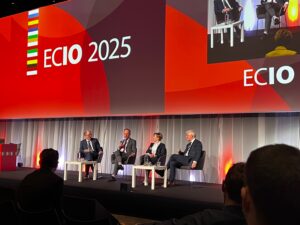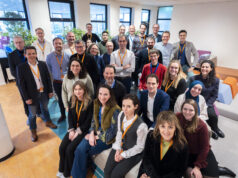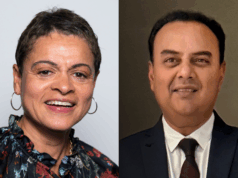
Pereira, Burgmans, Crocetti, and Arnold
In a discussion among leading figures in interventional oncology (IO), consensus developed around the growing clinical relevance of the field and the pressing need for data to match this. Speaking during a panel debate at the recent European Conference on Interventional Oncology (ECIO; 12–16 April, Rotterdam, The Netherlands), participants tackled the practical and philosophical challenges of positioning IO alongside surgery, systemic therapy, and radiation as the fourth pillar of modern cancer care.
Kicking off the session, Laura Crocetti (Cisanello University Hospital, Pisa, Italy) emphasised the need for guideline inclusion beyond liver-focused indications. “We are involved in the treatment of many kinds of cancer, not only colorectal liver metastases. I’m thinking about thyroid, about kidney—we should be in all the guidelines, but we need research. We must produce data; this is very important. Research is a major point for us.”
This sentiment was echoed throughout the session, as speakers repeatedly returned to the theme of high-quality clinical service and evidence generation. “We must provide a clinical service—without that, [IO] is never going to fly,” said Mark Burgmans (Leiden University Medical Center, Leiden, The Netherlands). He described that in providing a clinical service, equipped with all of the new tools and techniques the field has gained over recent years, interventional oncologists will need to prove themselves in clinical studies. He cited Martijn Meijerink et al’s COLLISION trial—which was a randomised, international, multicentre, phase III non-inferiority trial which demonstrated comparable results between thermal ablation and surgical resection for small-size colorectal liver metastases, as a benchmark example of how IO can deliver high-quality randomised controlled trial (RCT) data.
Yet others questioned whether RCTs should be the default path forward. Dirk Arnold (Asklepios Tumorzentrum Hamburg, Hamburg, Germany) reflected on his shift in thinking that he presented during his ECIO Honorary Lecture in 2023: “Two years ago, I made the claim that you should not focus too much on randomised trials, because it’s a therapeutic principle between widespread metastatic disease and localised metastatic disease, localised disease. You will get so much evidence by optimally treating patients and integrating therapeutic algorithms. This may be enough.”
However, Arnold stated that the publication of COLLISION results “contradicts” this thinking, acknowledging that RCT data instils greater confidence in situations where it is necessary to compare local ablative treatment to resection. To this, Burgmans stated that RCTs are not always necessary, “but unfortunately we sometimes face debates with colleagues and health insurance, with authorities who say that they want us to provide randomised, phase 3 trials with a survival benefit,” he said.
“Sometimes medical oncologists annoy me a bit with their rigid thinking that we always need RCTs to prove that something is worth doing,” continued Burgmans. He added that endpoints like progression-free survival and quality of life should also be accepted, especially where overall survival is difficult to assess.
Phillippe Pereira (SLK-Clinics GmbH, Heilbronn, Germany) reinforced the financial burden of trials, calling RCTs “very expensive” and arguing that real-world data and registries could provide a more feasible evidence base. “Interventional oncologists are very strong in producing registries. Some papers have shown that there is a very good correlation between the result of [an] RCT and the result of the real-world analysis,” Pereira explained.
Moving on, the panel turned to the increasing complexity of IO, given the rapid innovation in tools and technology, and the workforce’s capacity to keep up. “We all agree that we will need to move forward in a multidisciplinary way, but it will be very complicated,” said Pereira. “There are so many drugs and possibilities— local treatment, sequential treatment, and so on. We will need artificial intelligence.”
Arnold agreed, suggesting a reversal in the traditional scientific methodology. “We must collect what we see. We must document and analyse this with artificial intelligence to detect the factors that influence long-term survival, reverting the art of science. We don’t bring a theory to an experiment and observe. We observe, and then we have to ask what led us to this observation,” said Arnold.
Though the discussion ended with cautious optimism, Crocetti stating that they must “continue to dream” for a better future for IO, Pereira pushed for pragmatism. “I don’t like to end the discussion with a dream. We have been dreaming for the last 30 years, but IO has reached a crucial point now,” he said.










